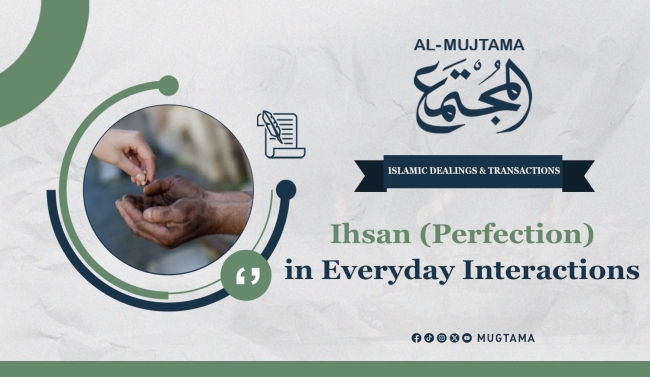Ihsan (Perfection) in Everyday Interactions
Ihsan (perfection) is one of the most noble and greatest acts of worship. As Al-Raghib mentioned in his book “Al-Mufradat fi Gharib al-Quran,” ihsan can be understood in two ways: either as an act of kindness towards others or as doing something in an excellent manner. It is to know and act in the best way possible.
As angel Jibril said to the Prophet Muhammad (peace be upon him) when asked about ihsan, “To worship Allah as if you see Him, and if you cannot achieve this state of devotion then you must consider that He is looking at you.” (Narrated by Muslim)
The muhsin (one who perfect their deeds) is the one who is always aware of Allah's presence. He does not utter a word or take an action without thinking, knowing that Allah is watching him, which instills in him fear and humility before Allah. Ihsan is not limited to acts of worship but extends to all interactions. As Abu Ya'la Shaddad bin Aus narrated from the Messenger of Allah (peace be upon him), “Verily, Allah has prescribed proficiency in all things.” (Narrated by Muslim)
Ihsan in human interactions takes many forms:
1-Ihsan to Parents
Numerous Quranic ayahs and hadiths emphasize the importance of honoring parents, being kind to them, and treating them well. Allah has linked their kindness with His worship because of their great sacrifice for their children. Allah says, “And your Lord has decreed that you not worship except Him, and to parents, good treatment. Whether one or both of them reach old age [while] with you, say not to them [so much as], 'uff,' and do not repel them but speak to them a noble word.” (Al-Isra: 23)
2-Ihsan to Relatives
Abu Huraira (may Allah be pleased with him) narrated that the Messenger of Allah (peace be upon him) said: “He who wishes to have his earnings grow (and be blessed) and his term of life prolonged, he should keep ties with his kin.” (Narrated by Al-Bukhari)
Sheikh Abdullah Fawzan, in his book “Minhatu al-'Alam fi Sharh Bulugh al-Maram,” explained that keeping ties in this hadith means treating relatives with ihsan by visiting them, checking on them, bringing joy to them, providing them with good, and averting harm from them. It also includes financial support under the proper conditions, giving charity, gifts, bequests, or endowments as explained in books of jurisprudence.
3-Ihsan Between Spouses
Spouses are commanded to be kind to one another to maintain harmony. Abu Huraira (may Allah be pleased with him) narrated that the Messenger of Allah (peace be upon him) said: “The believers who show the most perfect faith are those who have the best disposition.” (Narrated by At-Tirmidhi) Even if they must part ways, Allah has instructed them to part with kindness. Allah says, “Then, either keep [her] in an acceptable manner or release [her] with good treatment.” (Al-Baqarah: 229)
4-Ihsan to Neighbors
Islam encourages kindness to neighbors by avoiding harming them and fulfilling their rights. Allah says, “Worship Allah and associate nothing with Him, and to parents do good, and to relatives, orphans, the needy, the near neighbor, the neighbor farther away, the companion at your side, the traveler, and those whom your right hands possess.” (An-Nisa: 36)
5-Ihsan to Orphans and the Needy
This involves treating them kindly, helping them financially, and not belittling or harming them. Allah says, “And to parents do good, and to relatives, orphans, and the needy.” (An-Nisa: 36)
6-Ihsan to All People
This includes speaking kindly, as Allah says, “And speak to people good [words].” (Al-Baqarah: 83) and acting kindly: “And do good; indeed, Allah loves the doers of good.” (Al-Baqarah: 195) Islam also urges kindness to those who wrong us. Allah says, “And not equal are the good deed and the bad. Repel [evil] by that [deed] which is better; and thereupon the one whom between you and him is enmity [will become] as though he was a devoted friend.” (Fussilat: 34) and kindness in argument: “And argue with them in a way that is best.” (An-Nahl: 125)
As Umar bin Abdul Aziz wrote in a letter to Abdul Hamid, the governor of Kufa, “The foundation of religion is justice and proficiency.” Therefore, do not neglect the foundation of religion, as the rewards for those who perfect their deeds are tremendous. Allah says, “They will have whatever they desire with their Lord. That is the reward of the doers of good.” (Az-Zumar: 34)
-------------------------------------------------------------------------
- Tafsir modoee.
- Aluka.net, Al-Ihsan in Islam.
- The Official Website of Sheikh Ibn Baz, the Meaning of Ihsan and the Intent of the Doers of Good.
- dorar.net, Encyclopedia of Ethics and Conduct.
- Islamweb.net


